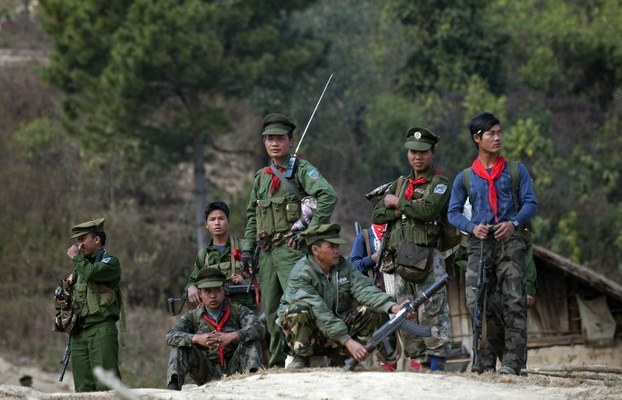




Myanmar’s army and its ethnic army foes in the decades-long conflict in Myanmar’s Shan state have both committed human rights abuses against civilians, Amnesty International said in a report on Thursday.
In Caught in the Middle: Abuses Against Civilians Amid Conflict in Myanmar’s Northern Shan State, the London-based Amnesty found that “the Myanmar military subjects civilians to arbitrary detention, often arresting men and boys on the basis of their ethnic identity and a perceived link with a particular armed group.”
It also accused the military of torturing those it detained, holding detainees for three months without access to lawyers, subjecting detainees to forced labor, firing weapons in civilian areas, killing and injuring civilians, and damaging homes and property.
The report identified Myanmar’s 99th Light Infantry Division as a repeat offender, saying the elite unit was implicated by Amnesty International and the U.N. Fact-Finding Mission and other groups in committing atrocities that include mass deportation, murder, rape, and the burning of homes against Rohingya Muslims when it was stationed in western Rakhine state in 2017.
“The fact that less than 18 months after these crimes, soldiers from the same division were committing new violations – including crimes under international law – highlights once again the need for the international community to take action and ensure that those responsible do not continue to enjoy immunity for their crimes,” the report said.
Nicholas Bequelin, Amnesty International’s Director for East and Southeast Asia said the report “highlights the urgency of international action to hold Myanmar’s military – not least its senior generals – accountable.”
The three ethnic groups that make up the Brotherhood Alliance fighting in northern Shan state were also found by the report to have abducted civilians, subjecting civilians to forced labor, and “widespread ‘taxation’ and extortion.”
No denial from Tatmadaw
Myanmar’s military, known in Myanmar as Tatmadaw, did not reject the report’s findings but said that they are internally disciplining rights abuses within their ranks. Meanwhile one of the three ethnic insurgent groups denied committing abuses alleged by the report.
“We will not refute these accusations since this is not the first time [we have been accused]. Instead, we will only talk about what the military has done in response to the alleged human rights violations,” said Brigadier General Zaw Min Tun from the military’s information committee.
“We have been taking actions against military personnel when they commit rights violations or break the law,” added the military spokesperson.
He added that the military’s legal division has been working on providing education to soldiers on human rights violations and laws related to military activities, saying that this type of education is necessary to build a modern fighting force.
Ethnic group claims innocence
Ta’ang National Liberation Army (TNLA) spokesperson Major Mai Aik Kyaw denied that the TNLA used forced labor, arbitrarily arrested people or tortured them.
“We don’t have any policy, nor have we ever given orders to use [forced labor,]” he said.
“We don’t know where [Amnesty International] gathered the data to make these accusations,” he added.
RFA attempted to contact several other ethnic armed groups implicated in the report, including the Kachin Independence Army (KIA), the Shan State Army - North (RCSS/SSA) and the Shan State Army - South (SSPP/SSA), but were unable to reach them as of Thursday evening.
Records provided by the local Ta’ang Women’s Organization (TWO) document over 30 cases of forced labor, arbitrary arrests, tortures and civilian abductions in 2019.
In many cases, the civilians are not aware of their rights and are made to feel like they have a responsibility to their assailants, according to TWO spokesperson Lue Chee Sawar.
She said the Myanmar military was the organization that was most guilty of rights violations.
“The ethnic armed groups are only second to them,” she said.
“We have witnessed many cases where justice was never served. We would like to see special investigations into these cases, both on the military and the ethnic armed groups. We also welcome the international community to push the authorities to take action,” the spokesperson said.
Ongoing clashes in northern Shan state have violated a unilateral truce called by the Brotherhood Alliance of three ethnic armies, comprising the TNLA, Arakan Army (AA), and Myanmar National Democratic Alliance Army (MNDAA), which runs to the end of the year to give them time to engage in peace negotiations with the Myanmar military.
A temporary unilateral truce called by the Myanmar Army in five military command regions, including Shan state, in December 2018, expired in September.
For most of seven decades since Myanmar, formerly known as Burma, gained independence from Britain in 1948, the country has been under various forms of military dictatorship and been engaged in war with ethnic armies on many of its borders. The army still plays a dominant role in national affairs.
Reported by Nay Myo Htun for RFA’s Myanmar Service. Translated by Ye Kaung Myint Maung. Written in English by Eugene Whong.